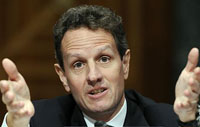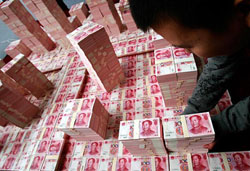Currency War: “The Worst of Wars"
Currencies / Fiat Currency Oct 31, 2010 - 01:21 PM GMTBy: Bryan_Rich
 Last week, here in Money and Markets, I suggested that the recent G-20 finance minister meetings could have a meaningful influence on the next trend in global currencies and other key markets. Therefore, we should pay very close attention to market activity.
Last week, here in Money and Markets, I suggested that the recent G-20 finance minister meetings could have a meaningful influence on the next trend in global currencies and other key markets. Therefore, we should pay very close attention to market activity.
I also suggested that this “influence” could be in the form of a coordinated intervention by G-4 economies (U.S., U.K., euro zone and Japan) to weaken the yen, a viable antidote to the bubbling and divisive currency tensions.
And given the context of the statement from the G-20 last weekend, that scenario looks quite plausible.
G-20: What They Said
The United States is the lead negotiator in trying to convince China to revalue its undervalued yuan. But U.S. officials are simultaneously operating under the growing perception that it may be seeking a weaker currency of its own — by planning for another round of quantitative easing — thereby threatening its credibility.
That’s why U.S. Treasury Secretary Tim Geithner made a strategic move to influence the G-20 agenda. He preceded the formal meetings last weekend with a letter to his G-20 counterparts, recommending a unified position and the language for G-20 opposition to the growing currency tensions in the world.
|
And for the most part, it worked.
Here’s the key take-away from the final G-20 communiqué and what it could mean for the direction of markets …
First, the communiqué said that they “met with a sense of urgency.” In fact, an ECB policymaker later called the dangerous currency wars “the worst of wars, because at the end there is no winner.”
This is significant …
The last time they made such a statement of urgency was when the euro was on the edge of a cliff. It coincidently bottomed the first trading day after meetings concluded.
Second, while they agreed to “refrain from competitive devaluations,” they also said advanced economies would be “vigilant against excess volatility and disorderly movements in exchange rates.”
That may sound like a contradiction …
The mainstream perception is that this whole currency war threat is driven by the recent interventions by Japan, South Korea, Brazil, Thailand and the like. So now they’re pledging to refrain from competitive devaluations (i.e. intervention). Yet they agree that “advanced economies” would be vigilant against unpalatable currency moves (i.e. intervention).
Next, they went on to say that certain countries “need to move to more market-determined exchange rates.” Moreover, the effort by advanced economies to keep currencies in check would “help mitigate the risk of excessive volatility in capital flows facing some emerging countries.”
Again, sounds contradictory. But it’s not.
Consider this, a very notable phrase stood out in Geithner’s pre-G-20 letter: Countries should avoid “competitive undervaluation.” Notice he said undervaluation, not devaluation. This is very carefully crafted language.
Along with the other important statements above, you can interpret, from the perspective of global finance leaders and central bankers, that the “currency war” is being staged by one opponent: China.
|
G-20: What They Didn’t Say
What is important to note, and a key reason market participants have thought the G-20 event was a bit of a snoozer, is that the statement didn’t call-out Japan on its recent intervention to weaken the yen. And it didn’t chide Thailand, South Korea, Brazil, Indonesia, Russia and others for recent currency market interventions and new capital controls — what’s been thought to be the evidence of currency wars.
In fact, just two days following the G-20 meetings, Japan had already continued its tactics to weaken the yen. Japan’s vice finance minister warned of more yen intervention, saying intervention is “most effective when it’s a surprise.”
And South Korea has already raised the prospect of introducing more capital controls.
What the communiqué does is it opens the door to a coordinated intervention of G-4 economies. And the likely action is to weaken the yen against the dollar. Consequently, other Asian and emerging market currencies would probably weaken against the dollar, too.
And since China continues to link its yuan closely to the value of the dollar, the currencies of emerging export-centric economies would get relief through a narrower currency disadvantage with China. That would be a big step toward suppressing the growing threat of protectionism and keeping the G-20’s pledge of global unity and cooperation on path.
It just so happens that next week the central banks of all G-4 economies will sit down to monetary policy meetings. Could we see a coordinated response to mitigate the currency wars? If so, expect any response to currencies to have a major impact on the direction of all global financial markets.
Regards,
Bryan
This investment news is brought to you by Money and Markets. Money and Markets is a free daily investment newsletter from Martin D. Weiss and Weiss Research analysts offering the latest investing news and financial insights for the stock market, including tips and advice on investing in gold, energy and oil. Dr. Weiss is a leader in the fields of investing, interest rates, financial safety and economic forecasting. To view archives or subscribe, visit http://www.moneyandmarkets.com.
© 2005-2022 http://www.MarketOracle.co.uk - The Market Oracle is a FREE Daily Financial Markets Analysis & Forecasting online publication.





